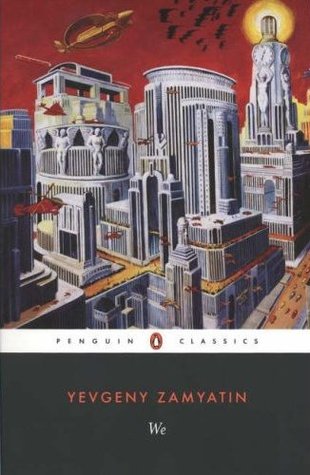Author: Yevgeny Zamyatin
Translator: Clarence Brown
Pages: 230 (ebook)
Published: 1921
Published by: ENC Press
The first dystopia ever, it started asking uncomfortable questions about individuals, collectives, revolutions, progress — and the collectives’ rights to individuals’ souls in the name of revolutions and progress.
Digit D-503 is a proud and happy citizen of the United Nation, where people live in identical glass houses and think identical transparent thoughts, equal among themselves and equally happy to be cogs in the machine of the most perfect society that ever existed on earth. The designer of the Integral, the United Nation’s first spaceship, meant to carry “mathematically error-free” happiness to other forms of intelligent life “possibly still existing in the primitive state of freedom,” D-503 is a True Believer in the path of the United Nation until he is mugged by reality that comes in the guise of love for a beautiful, cynical woman who rejects state-sponsored happiness and delights in leading a rebellion.
Yet the rebels’ only virtue is their rejection of the authority of the Do-Gooder, the annually unanimously reelected leader of the United Nation. Their revolution is but for its own sake, and their attitude toward “human slivers” is just as utilitarian as that of the United Nation: to either group, an individual life’s worth is measured only by its usefulness to the cause.
In this, the first dystopian novel and the influence for so many great others, the reader follows D-503. He is one among a collective, doing as he is told and as is set out for him, question nothing and perfectly content in his same-ness. He is the architect of the Integral, the first spaceship, designed to begin to take this perfect, regimented, organised way of life to the rest of the universe. It is only when he meets the captivating I-330 that he begins to stray from the way set out for him and realise that it might not be as perfect as he had previously thought. We are reading his journal, something he intends to be taken on the Integral as an educational tool for those civilisations they meet and 'educate'.
Written in 1921, this is a truly revolutionary book, and you can see its influence on many other books out there, 1984 particularly springing to mind with the regimented schedule and institute of watchful agents. The world created is one that is believable, and numerous times D- states how much better their world is than ours, how misguided we were thinking that things like democracy and personal freedoms made our lives better. How integrated people are, and how some people eventually begin to rebel, are both well done, and I particularly liked was the struggle that D- went through. He didn't just jump on board with the rebellion, there was true personal struggle and realistically human indecision and fear of the unknown. He is, after all, someone who has been one of many for all his life and never really had to think for himself or make any real decision.
There are a small core of characters, but it is only really three that you get any sense of feeling for: D-503, I-330 and O-90, she being D-'s lover at the start of the story. Others flit in and out, but you never really get to know them, and even these three there's a limit to how much you get to know them in that the regimented nature of their lives limits their ability to actually develop into individuals as much as they would have done otherwise. Even the rebellious I- is only really different in her rebellion: she does things because she's not supposed to; you don't really get the feeling she's doing things she likes. D- is clearly very intelligent and seems like a nice enough character, but as the narrator you don't get to see him that much, even if he is rather perceptive when it comes to others.
O-90 is possibly the character I was most attached to. She doesn't get huge amounts of page time, but she seems the most human of the characters we meet. The emotional journey she goes through is wonderfully evocative, and totally relatable. You can't help but feel for her and everything she goes through in the course of the story.
The story itself wasn't particularly gripping, but it was interesting seeing this world and how it's been put together, especially the 'vote' for the Do-Gooder, the unanimously re-elected leader of the United Nation
An easily recommendable book, both for its own merits and as a look at the beginning of a genre which is coming more and more to the fore.


No comments:
Post a Comment